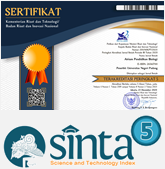The Effect of Problem Based Learning Model Implementation Toward Students’ Learning Competencies at SMPN 2 Padang Panjang
Abstract
Keywords
Full Text:
FullpaperReferences
Aswan, D.M. 2017. Pengaruh Model Problem Based Learning Terhadap Keterampilan Belajar IPA Peserta Peserta Didik Kelas VIII SMPN 1 Kecamatan Gunung Omeh Tahun Pelajaran 2016/2017. Padang: UNP Press.
Budiani, S., Sudarmin, dan R. Syamwil. 2017. Evaluasi Implementasi Kurikulum 2013 di Sekolah Pelaksana Mandiri. Innovative Journal of Curiculum and Education technology Vol. 6 No. 1
Fauzan, M., A. Gani, dan M. Syukri. 2017. Penerapan Model Problem Based Learning pada Pembelajaran Materi Sistem Tata Surya untuk Meningkatkan Hasil Belajar Siswa. Jurnal Pendidikan Sains Indonesia, 5(1), 27-35.
Hande, S. Mohammed, C.A, and Komattil, R. 2015. Acquisition of Knowledge Generic Skill and Attitude through Problem Based Learning: Student Perspective of a Hybrid Curriculum. Journal of taiba University Medical Science, 10(1), 21-25.
Kementerian Pendidikan dan Kebudayaan. 2016. Silabus Mata Pelajaran Sekolah Pertama, Madrasyah Tsanawiyah (SMP/MTs) Mata Pelajaran Ilmu pengetahuan Alam. Jakarta: Kementerian Pendidikan dan Kebudayaan.
Mardiana, S. 2017. Implementasi Kurikulum 2013 dalam Pembelajaran Sejarah di SMA Negeri 1 Metro. Jurnal Historia Vol. 5 No. 1
Rahayu, S., A. Hidayat. 2017. Penerapan Model Pembelajaran Problem Base Learning (PBL) Terhadap Kemampuan Berfikir Kritis Siswa Kelas X IPA SMAN 1 Sukawangi pada Materi Pencemaran Lingkungan. Jurnal Skripsi Pendidikan Biologi.
Shafa. 2014. Karakteristik Proses Pembelajaran Kurikulum Dinamika Ilmu. Dinamika Ilmu Vol 14. No 1
Sudjana. 2005. Metoda Statistika. Bandung: Tarsito
Trianto. 2012. Mendesain Model Pembelajaran Inovasif- Progresif. Jakarta: Kencana Prenanda Media Group.
Wicaksono, T.M., Muhardjito, dan T. Harsiati. 2016. Pengembangan Penilaian Sikap dengan Teknik Observasi, Self Assesment, dan Peer Assesment pada Pembelajaran Tematik Kelas V SDN Arjowinangun 02 Malang. Jurnal Pendidikan, 1(2), 45-51.
DOI: http://dx.doi.org/10.24036/apb.v4i3.6375
DOI (Fullpaper): http://dx.doi.org/10.24036/apb.v4i3.6375.g3600




